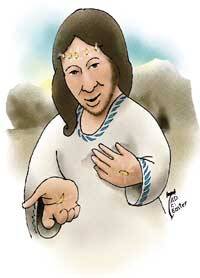Beyond Hope
Some years ago my mom and I took a trip to the Grand Canyon. We drove from Chicago, stopping along the way whenever something took our fancy. There were chance encounters with people who offered spontaneous kindness and others whose rudeness challenged us not to respond in kind. When we reached our destination, the experience was indescribable—greater than what we could imagine and impossible to capture in words or photos. There were experienced trailguides and interpretive signs, but what we saw was far beyond what the geological explanations could tell. We sat gazing in hushed awe. Words would do a disservice to the immense beauty that engulfed us.
In a similar fashion, no words are capable of expressing what happened to Jesus at Easter or what happened to the first disciples who experienced him as resurrected. The only adequate response is contemplative awe, yet we need to try to say something of what this experience means for us.
In the Gospel story today, two of Jesus’ disciples are talking and debating as they walk away from Jerusalem, the place of pain and confusion, trying to make meaning of it all. They are struggling to see how to make sense but cannot yet do so. As Jesus joins them, he first elicits from them their own interpretation. They retell what they experienced of Jesus as “a prophet mighty in deed and word before God and all the people,” and they recount the truth of his brutal murder. They speak of what their hopes were, but these now seem dashed. They tell about what some of the women experienced at the tomb and their interpretation that Jesus was alive. Others went to see for themselves and found the tomb empty, but they did not see him alive, as the women had.
Different disciples are at different stages in their journey with and toward the risen one, each seeing something different and each needing to interpret it in their own words.
It is remarkable that Jesus does not immediately interpret for Cleopas and his companion what their journey with him means. Then, as now, Jesus first asks his disciples to try to say what they (or we) have experienced and how we understand what has happened. This first step takes us only part of the way.
To go the next step on the journey it is necessary to turn to the Scriptures—the official guidebook, if you will—which help to unravel the meaning. Immersing ourselves in the whole story, from Moses through all the prophets, we understand a little more of Jesus’ prophetic life and mission. We see, too, how we are asked to conform our own lives to this journey of prophetically embodying good news for the most vulnerable, being prepared to accept its cost. Essential for this journey is the abiding presence of the risen Jesus. As did those first disciples we, too, implore him to stay with us. And he does. He continues to open our eyes by unfolding the Scriptures to us and by making himself known in the breaking of the bread.
No words adequately express our experience of what it is like to have him risen among us. Resurrected life far exceeds all our hopes and is far more than a happy ending to a tragic story. It is not only what happened to Jesus, but it is already lived by us, whose lives are “hidden with Christ in God,” as Paul says. It is not only the end of a life’s journey, but is tasted already now, all along the way. It is beyond all that we had hoped and even now sets our hearts burning within us.
This article also appeared in print, under the headline “Beyond Hope,” in the March 29, 2010, issue.








